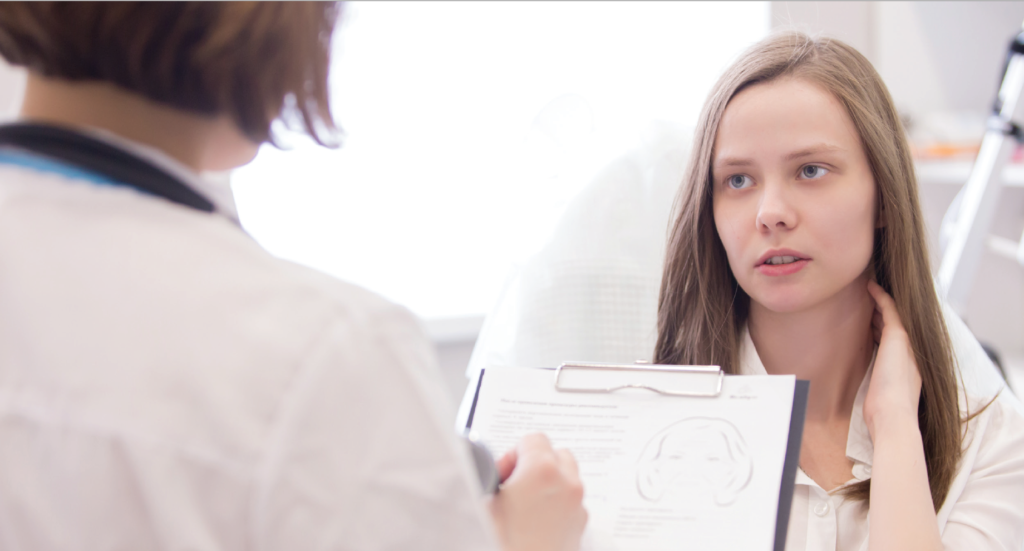Fully 7.7% of adolescent acne patients report a low quality of life due to their skin condition, a new study shows.
In a multidisciplinary analysis, factors associated with poor mental health among patients with acne included excessive recreational screen time and social media use. Conversely, physical activity and social support appear to boost mental health in people with acne, the study notes.
To better understand the impact of acne on patients’ mental health, investigators analyzed survey responses from 335 adolescents in the SEROCoV-KIDS study, a population-based prospective study that tracks the impact of the Covid-19 pandemic on children and adolescents in Geneva, Switzerland.
In a multivariate analysis, 19.4% of respondents with acne maintained high Acne-Specific Quality of Life (Acne-QoL) scores. Compared to this group, those with acne and low Acne-QoL scores tended to have lower self-esteem and less psychosocial well-being and resilience. Regarding risk and protective factors, the low Acne-QoL group also had less social support, lower participation in sports, and more screen time and social media addiction.
Social Media Surge
“Over the past decade,” the study authors write, “the surge in social media and Internet use, further intensified by the unprecedented impact of the Covid-19 pandemic, has led to profound transformation in the behaviors of the younger generation.”
According to a recent study, social media worsens the psychological burden of acne by encouraging users to judge their appearance against that of others, often represented through edited online images.
Rick G. Fried, MD, PhD, Dermatologist/Clinical Psychologist and Clinical Director of Yardley Dermatology Associates in Yardley, PA, says that the study provides another wake-up call for dermatologists and others who treat acne that it can potentially be a devastating disorder with short- and long-term consequences. “The new twist in 2025 is how much of a role social media can play in causing the acne sufferer to retreat and be burdened by misinformation and bullied,” says Dr. Fried, who was not involved with the study but was asked to comment.
Although the average dermatologist is unlikely to administer tools such as the Acne-QoL questionnaire in clinic, displaying key questions where patients can consider them while waiting in exam rooms can help start a conversation, he says. For decades, Dr. Fried has warned that clinicians cannot assume that the emotional impact of acne mirrors its clinical presentation—some patients might be devastated by a couple comedones, while others with scarring inflammatory acne may take it in stride.
Look for Nonverbal Cues
If you suspect a patient with acne is having an active mental health issue, he suggests asking questions such as, “Has your acne made it difficult for you to feel good about yourself or comfortable in your skin, or to attend school or socialize?” If the patient responds with a nod or a tear, “You know you’re onto something.”
If a patient is clearly suffering significant emotional distress, says Dr. Fried, gently ask whether their present difficulties have led to thoughts of hurting themselves or others. “If there’s silence, the answer is probably yes.” Patients who are concerned that they might act on these ideas require immediate psychiatric care. Although such cases are rare, he adds, they provide an opportunity to refer patients to skin-emotion specialists or acne coaches, and to explain that these practitioners understand the burden of dermatologic problems and can help clear their acne faster.
The key message patients need to hear, says Dr. Fried, is that their dermatologist, physician assistant, or nurse practitioner considers acne a big deal and is extremely motivated to clear their skin as quickly as possible. Because some parents only want their children treated with natural remedies, he says, telling families that you would only offer treatments you would provide to your own loved ones can help allay concerns. While some parents need a gentle nudge, Dr. Fried adds, occasionally he must beg or even more forcefully push parents to let him treat their child correctly, with the full range of treatments available, including isotretinoin if indicated.
“It’s an exciting time. We’ve got a wonderful acne tool bag, and sharing that with patients is important.”
By the time many patients with acne reach a dermatologist, he explains, they’ve experienced several treatment failures and may be feeling hopeless. “Look them in the eyes and say, ‘There’s no one whose acne we can’t fix. And I’m not giving up until your skin is clear.'” What many patients need most, Dr. Fried says, is a sense of empowerment against the unpredictability of acne.
The study was published in Clinical and Experimental Dermatology.


